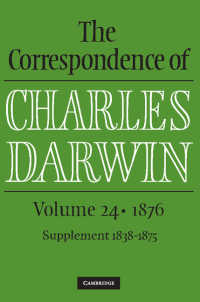- ホーム
- > 洋書
- > 英文書
- > Cinema / Film
Full Description
In Time, Existential Presence and the Cinematic Image, Sam B. Girgus relates Laura Mulvey's theory of "delayed cinema" to ideas on time and the relationship to the other in the writings of Jean-Luc Nancy, Emmanuel Levinas and Julia Kristeva, among others. The sustained tension in film between, in Mulvey's phrase, "stillness and the moving image" enacts a drama of existential emergence. The stillness of the framed image in relation to the moving image opens "free" cinematic time and space for a fresh engagement with crucial ethical and cultural issues. With close readings of films such as The Bicycle Thieves, Two Days, One Night, The Three Burials of Melquiades Estrada, The Revenant and The Age of Innocence, this book proposes a fresh approach to reading film in the context of emerging existential presence and the ethical imperative.
Contents
Introduction: Existential Presence and the Cinematic Image: Ethics and Emergence to Being in Film
Part I. The Otherness of Existence and "Spacious Temporality": Delayed Cinema and FreedomChapter 1: Delayed Cinema and "The Space-Time of Freedom": De Sica's Bicycle Thieves (1948)Chapter 2: La Demora (2012)Chapter 3: Existence and Ethics in the Dardenne Brothers' Two Days, One Night (2015)
Part II: Western Spaces: Landscapes of Denial, Death, and FreedomChapter 4: El Viaje: Tommy Lee Jones and the Violent Times of the Mission to MexicoChapter 5: The American Way: Time, Death, and Resurrection in Iñárritu's Western Masterpiece
Epilogue: Time, Spacing and the Body in Martin Scorsese's The Age of Innocence (1993)








